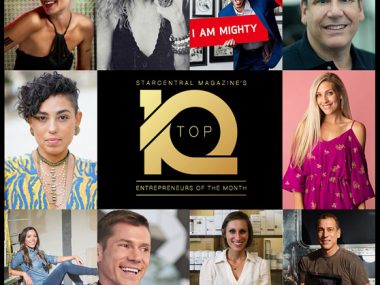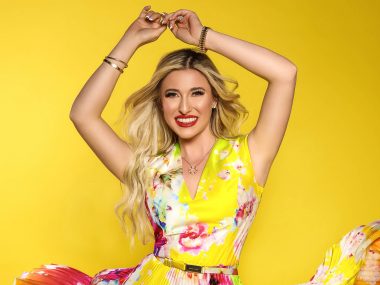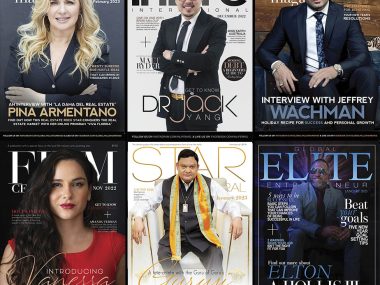Photo Credit: Joshua Monesson
Raquel Baldelomar is the founder and president of Quaintise, a marketing and branding agency, based in Santa Monica. For 15 years, Quaintise has produced award-winning creative content for clients in the health and wellness sectors. Raquel has a finance degree from the MBA-modeled Business Honors Program at the University of Texas at Austin and began her career managing private equity portfolios as a financial analyst for JP Morgan Private Bank. In 2003, Raquel launched Quaintise and has served leading national health and wellness organizations by building their brand currencies through compelling storytelling, strong messaging, and visually engaging creative assets.
In 2015, Raquel decided to devote more time to one of her passions – changing the conversation of healthcare from sick care management to disease prevention. She is co-author of the book Sugar Crush: How to Reduce Inflammation, Reverse Nerve Damage, and Reclaim Good Health. She is also a Forbes columnist where she reports on corporate wellness, executive health, and the creative process. Raquel is also a TV host and producer for CNN focusing on stories related to executive health, wellness, and how travel stimulates creativity. Her goal is to share with audiences compelling stories that educate people on how pausing can lead to a more meaningful kind of productivity, creativity, and wellness.
StarCentral Magazine recently caught up with Raquel to discuss her journey to entrepreneurship and here’s what went down:
Could you please tell our readers a brief background about yourself and how you started your business?
My name is Raquel Baldelomar, and I’m an entrepreneur, journalist, and co-author of the book Sugar Crush (Harper Collins, 2015) with my memoir, American Inca, in the pipeline. As the founder of the health and wellness ad agency Quaintise, my business niche lies at the intersection of health, marketing, and entrepreneurship, a place I arrived at through a lot of soul-searching, risk-taking, and mentorship. I also own a nutraceuticals supplements company, HPD Rx. As a self-made entrepreneur, I have an audience of more than 20,000 Instagram followers, largely professional businesswomen in their 30’s and 40’s who connect with my personal motto: “Work hard, play hard, and create hardest.”
I graduated with a finance degree from the MBA-modeled Business Honors Program at the University of Texas at Austin and began my career managing private equity portfolios as a financial analyst for JP Morgan Private Bank. I was fulfilled financially but wasn’t using my creative skills. I had studied rhetoric in college and was fascinated by theories of persuasion and human psychology. Since advertising is the business expression of those ideas, I pivoted into that area.
I had no background in branding or advertising, and no experience working at an ad agency, but as Steve Martin once said, “I had that one element necessary for all early entrepreneurs – naïveté – that fabulous quality that keeps you from knowing just how unsuited you are for what you are about to do”. So I just went for it. In 2003, I launched Quaintise, and we quickly landed our first big client. I was 24 years old. Sixteen years later, our clients are some of the biggest names in health, wellness, and life sciences. I couldn’t be more proud of the work my team has done and where we are today.
Can you describe your journey to success, and did you ever imagine you would become this successful?
My journey wasn’t easy. When I quit my hundred thousand dollar a year job at JP Morgan to start Quaintise, I had to wait tables on the side to survive. To be an entrepreneur, you have to be able to dive into dark psychological waters and be a strong swimmer. You must have the courage to keep swimming when there are no guarantees that your gamble will succeed. All I had was my work ethic, some salesmanship, and the ability to curate great creative talent. By being a strong swimmer, I was able to find my niche, and turn Quaintise into the business it is today.
I also learned “busy” can be a trap. You can be busy chasing field mice or hunting antelope. I’ve always focused on hunting antelope because there’s a difference between working “in” your business, versus “on” your business. I make it a priority to give myself a lot of space to think and make big picture decisions. If you’re always immersed in routine, day-to-day tasks like answering emails and phone calls, you are being reactive instead of proactive.
What is your main source of income?
For years Quaintise has been my main focus and source of revenue. We work with companies at the cutting-edge of healthcare, and now are excited to be partnering with life sciences and genomics companies that are working to solve the COVID-19 crisis. It is exciting work. Last year, I and two other business partners launched an e-commerce company that leverages our expertise in digital marketing, branding, and packaging along with the expertise of our doctor partner who wanted to sell high-quality organic supplements. Because of the power of scalability, our one-year nutraceuticals line, HPD Rx, has already become a million-dollar business.
What are you currently doing to maintain/grow your business?
Our e-commerce business, HPD Rx, is the fastest-growing nootropic line on Amazon. That’s an exciting development for us, because e-commerce is more scalable than the ad agency business, with the potential for fantastic growth.
Our co-founder, Monte Swarup MD, is a renowned OBGYN who wanted to develop products for women who had cervical health issues after clinical studies showed how certain nutraceuticals could be beneficial for those patients. We then expanded into broader immune support, which is something that customers are very focused on and aligns with my own philosophies on health. I really believe in the power of supplements and have always preferred to take something that’s natural and preventative rather than a prescription pharmaceutical.
In terms of maintaining my ad agency business, it really boils down to people – our employees. To run a successful marketing agency, you need talented creatives. And to keep them, you must know how to motivate them. Creatives can be tricky—they may be aloof, grumpy at times, only like to talk at midnight, or only talk via email—but I will forgive many qualities if my creative team is talented.
What social media platforms do you usually use to increase your brand’s awareness?
I use LinkedIn for Quaintise, Facebook for HPD Rx, and for my personal account, I use Instagram, @rbaldelomar, where I share more of the multi-dimensional facets of myself, including my writing process, life philosophy, and travels.
What is your experience with paid advertising, like PPC or sponsored content campaigns? Does it work?
It does work! But only if you have really smart, experienced people handling it for you. Facebook and Google have remarkable AI and machine learning capabilities. They know consumers better than consumers know themselves, in a way. If you’re considering paid advertising or sponsored content, you absolutely need to work with someone who understands Facebook and Google’s constantly changing algorithms. Otherwise, you’re going to end up wasting a lot of money. That’s something we’re very involved in helping our clients with at Quaintise.
What is your main tactic when it comes to making more people aware of your brand and engaging your customers? How does your business stand out?
Brand awareness and customer engagement are built on great work and great products. That’s how you stand out. Positive testimonials, word-of-mouth recommendations, high client, and customer satisfaction—there’s nothing more effective for building brand awareness than that.
What form of marketing has worked well for your business throughout the years?
For Quaintise, our creative portfolio is key – having a powerful summary of the great work we’ve done for clients. That’s what we show prospective clients, and that’s how we sell ourselves. One of our case studies, for example, was a rebranding campaign we did for a vitamin and supplements brand with $20 million in annual sales. We created some visually stunning work for them, evolving their packaging and branding, which immediately drove sales. When you show a prospective client that kind of success story – it’s powerful.
What is the toughest decision you’ve had to make in the last few months?
Peter Thiel has said “if you want to create and capture lasting value, don’t build an undifferentiated commodity business.” One of the things I have seen over my 16 years at Quaintise is that marketing and branding have in many ways become commoditized. Today, there’s a low barrier to entry—anyone can hire a freelance design and marketing “expert” and cost-cut a true professional. Seeing our specialty services commoditized, often at the cost of quality, has been frustrating to watch. But, as I mentioned, you have to be a strong swimmer in order to be an entrepreneur. And be highly adaptable to change.
As I saw marketing and branding starting to become commoditized, I made the decision to diversify my business portfolio and branch out into e-commerce, in the shape of my nutraceuticals line, HPD Rx. These high-end health products have a much higher barrier to entry and are therefore much harder to commoditize, insulated from that kind of low-end competition. Starting a successful e-commerce product line is complicated; you have to be good at managing your supply chain, your inventory, negotiating raw material costs, plus packaging, design, and marketing. But in just one year, our HPD Rx brand is already a million-dollar business. Moral of the story? Don’t be afraid to make the tough decision to enter a complex business. Complex businesses mean is that there are higher barriers to entry, less competition, and a greater chance of success.
What money mistakes have you made along the way that others can learn from?
If you lose $1,000 on the blackjack table, would you try to recoup it there? No! Focus on what you’re good at, and make your money back that way. There was a time when I was starting to dabble with day trading because it was fun until I lost money and had to ask myself, how do I want to make that money back? The same way I lost it? No. I’m good at marketing, branding, packaging, and design. So I leaned into that.
What have you learned in the process of becoming wealthy that others can learn from?
That money has diminishing returns. And it may be the main measure of wealth, but it is not the only form of it. Family, time, relationships, health, culture, education, and even location are all measures of wealth, too.
What new business would you love to start?
I would like to start more e-commerce businesses focused on health and wellness. I’ve been studying consumer behavior during the COVID-19 pandemic, and people are buying more health testing products online. A dream business would be an e-commerce company selling at-home health test kits because that’s what people want and what society needs. The barrier to entry on that product will be high. But whether it’s testing kits or more supplements for health and longevity, those are business I would absolutely love to explore.
If you could go back in a time machine to when you were just getting started, what would you do differently?
I’d build a business that was truly scalable. Businesses that run on rocket fuel instead of gas fuel. Think about it—80% of rocket fuel gets used in the first 30 seconds of take-off. By the time it has launched, it has enough momentum to coast and not use any fuel.
In my agency business, my assets are my people, and they walk out the door every day, plus I’m constantly having to chase clients. It’s a business run on gas, not rocket fuel. E-commerce, on the other hand, runs on rocket fuel—meaning, there is a lot of up-front work, but once you’re up and running, it’s mostly about customer service and inventory management.
Do you have any favorite business-related or personal development-related books that you can recommend to other entrepreneurs?
I read a lot of books. Ray Dalio’s “Principles” is one of my favorites, and I especially love this quote: “The key to success lies in both knowing how to strive for a lot and fail well. By failing well, I mean being able to experience painful failures that provide big learnings without failing badly enough to get knocked out of the game.” It’s so true! You can lose games and still win the Superbowl, so it’s important to know how to pick yourself back up. “Pain plus reflection equals progress”, he says, because sometimes you need to be uncomfortable to transform.
I also love Scott Adams’ “How to Fail at Almost Everything and Still Win Big”. He says “if you want to be extraordinary, you have two paths: Either become the best at one specific thing. Or become very good (top 25%) at two or more things. Capitalism rewards things that are both rare and valuable. You make yourself rare by combining two or more “pretty goods” until no one else has your mix. Now add whatever your passion is, and you have two. And then try to develop a third skill, perhaps business or public speaking. You’d be hard-pressed to find a successful person who didn’t have about three skills in the top 25%.” I have used this advice to try to hone and refine my top three skills.
I also love Tim Ferriss’ books and podcasts. He is a really great interviewer and breaks down the habits and thought processes of extraordinary people.
What is the best advice you have ever been given?
“When you get to the top, remember there’s nothing there. The only thing that really matters is love. No matter what your achievements are, it’s very lonely if you’re not surrounded by some form of love.”
What advice would you give to a newbie Entrepreneur setting up their first business?
Profits are better than wages. Wages make your living, but profits make your fortune. So don’t give up, and stay the course! It’s going to be hard in the beginning—you’ll have to pay employees, contractors, rent, and suppliers. But once you turn a profit, you’re taking steps down a far more lucrative career path than one that’s reliant on someone else paying you a wage.
Now go out there, work hard, play hard, and create hardest!













